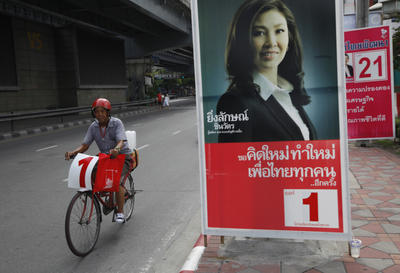A few days ago, Finance Minister Korn Chatikavanij called on the Securities and Exchange Commission (SEC) to reconsider the legal standing of opposition leader Yingluck Shinawatra, sister of ousted former prime minister Thaksin Shinawatra, even though the SEC cleared her name last week. The staunchly-conservative People’s Alliance for Democracy (PAD) has petitioned the Election Commission to dissolve the Puea Thai party, arguing that it is under the control of Thaksin who is among the 111 executive committee of the banned Thai Rak Thai party.
Most worrisome has been the army chief’s attempts to influence the voting. General Prayuth Chan-ocha said recently on national television that voters should elect ‘good people’ to Parliament as well as a political party that would protect the monarchy. Analysts and media outlets criticised the General for calling on the electorate to safeguard the monarchy since the Election Commission prohibits political parties and their candidates from referring to the Royal Palace in their campaigns. In a democratic society it is inappropriate for the army chief to express his political opinions weeks before the election. Observers remain concerned about how the army will respond if Yingluck and the Puea Thai Party win the elections. Yingluck has expressed interest in meeting with General Prayuth to mend the relationship between Puea Thai and the military. So far, her offers have not been taken up.
These moves are reminiscent of events that occurred in September 2008 when the Constitutional Court terminated the prime ministership of Samak Sundaravej on the grounds that he was illegally hosting a television cooking show, and working for a private company. Somchai Wongsawat was then appointed prime minister after a vote by the Parliament, but his tenure lasted only three months. The National Anti-Corruption Commission ruled that he had neglected his duties in the justice department in 2000. In the same vein, the 2006 military coup that forced Thaksin out of office was an undemocratic intervention that trumped Thai Rak Thai’s landslide election victory.
Given this record, the question ahead of the 3 July elections is how much political-weight do powers behind the scenes carry? The unseen hand that is trying to dictate the direction of Thailand’s political landscape could result in delaying a resolution of the country’s political divide.
Regardless of differences in voter opinion, the outcome of the elections must be respected and upheld. Reconciliation will not be the product of repression, but of respect for the democratic process. Normalcy after the elections is the desired outcome. The losing party must accept the verdict. Order in Thailand is vital for the country to tackle critical issues and resolve tension among voters such as improving income distribution, attracting foreign investors and countering the southern insurgency.
Chayut ‘Peko’ Setboonsarng is a recent graduate of George Washington University’s Master of Arts in International Affairs program.

